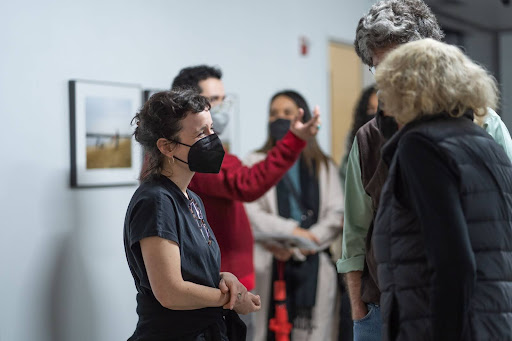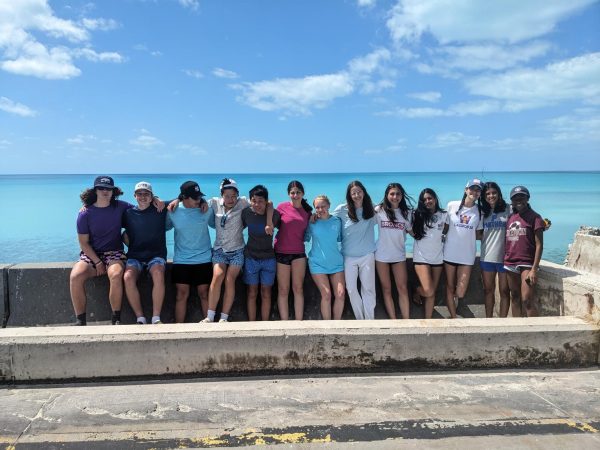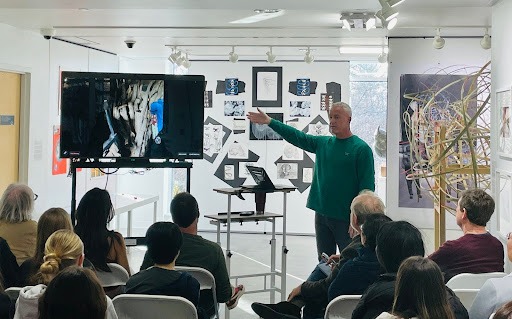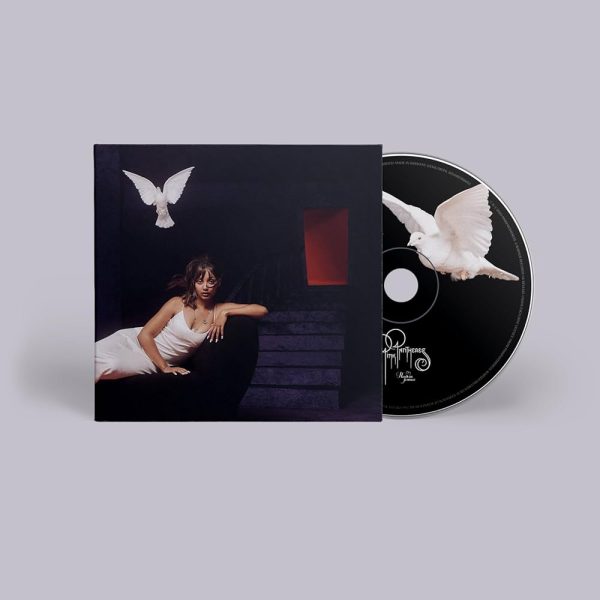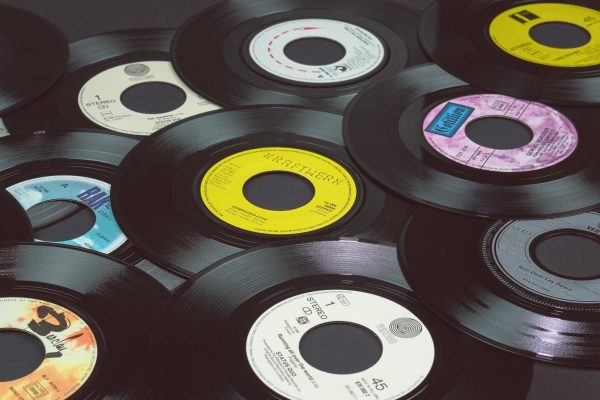PDS production of “Girls Like That” explores important social issues
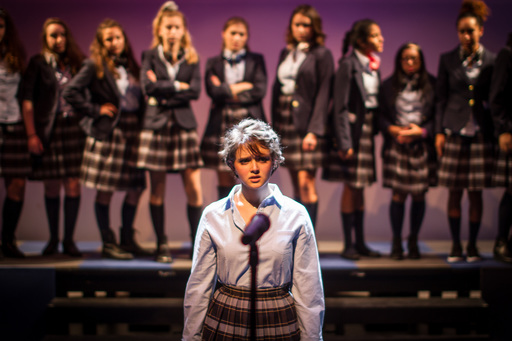
Scarlett (Ella Baseman) delivers her monologue as the other girls look on. (Courtesy of PDS)
“S***. S****. W****. H****. S***. T****.” This was how the fall play, Girls Like That, began — a series of demeaning slurs for female behavior, uttered in posh, obnoxious British accents, demonstrating from the start that this was no ordinary show. These words, spoken together by several girls, led into a rhythmic recitation of “you deserve what’s coming to you,” as a single, isolated girl’s silent silhouette stood on the stage and stared into the depths of her phone.
Girls Like That, performed by the PDS Upper School, was a phenomenal look into how the struggles historically faced by women across the globe have only escalated with the rise of social media. Going back to the 20th century, women dealt with issues and challenges ranging from smoking to flying planes to abortion to sexual harassment in the workplace, all of which are depicted in a series of flashbacks throughout the play in order to set the context for the struggles faced by Scarlett, a girl in the 21st century.
When a naked picture of Scarlett (Ella Baseman) goes viral, she is labeled and shunned by her former Saint Helen’s School friends, having no say in the situation. In the play, constant references to a “pecking order” of chickens that attack each other and target the weak to prove who is strongest, serve as a powerful metaphor for the Saint Helen’s girls. As the girls connect over gossip and rumors to target Scarlett, the play implies that such behavior was taught by their mothers with far worse consequences in this new generation.
A powerful contrast in the play occurs when a naked photo of a boy is sent throughout the school. When this happens, is he publicly shamed? Labeled a social deviant? An outcast? No. He is congratulated since “boys will be boys” and the double standard that exists in our society. Moreover, when Scarlett is blamed without proof for spreading the photo of the boy, all she can say in response is the vague word “sure,” because she understands that society’s constrictions have already stated she is at fault. She believes that there is nothing she can do about her status as a villain, as the weakest hen in the pecking order. Indeed, even when Scarlett escapes to a different school, the bullying from the Saint Helen’s girls does not stop. It is only when she goes missing that her former friends begin to regret their actions.
After being forced to stay silent and hear the hostile attacks thrown at her throughout the play, Scarlett finally stands up for herself, returning to Saint Helen’s School one last time to deliver a poignant monologue in an explosive ending. As she indicts her schoolmates for brutalizing her, her speech culminates with, “And I will forget you. I have forgotten you. Because I am not a Saint Helen’s girl. But you will not forget me. After all, you have my photo to remember me by.” And then she is gone from the school, leaving everyone around her in shock. When the other girls graduate from Saint Helen’s, they realize that the supposed “friends for life” around them have not been not friends at all, but rather have been something similar to a group of relentless competitors during their 13 years together.
When all of the girls except Scarlett return to Saint Helen’s for a reunion decades later, perhaps the most empowering scene in the play takes place. “And as we’re heading to the car park, I see the reception girls in the playground,” one of Scarlett’s former schoolmates says as she observes the new young schoolgirls. “But something’s wrong. One of them has built a snowman, but someone is trying to destroy it. A boy. And I wonder if I should intervene. Should say something. But what would I say? So we just watch. And then suddenly without planning, without saying a word, the girls start to link arms. All twenty of them. Making a barrier between the boy and the snowman. Her arm in her arm. Her arm in her arm. Her arm in her arm. Her arm in her arm. Her arm in her arm… And then one of them speaks, the smallest of the group: ‘Us girls stick together. Think you can break through us, boy? Go on. Just you try.’”
This scene demonstrates the irony yet hope of our era, powerfully illustrating that although women have been abused, attacked, and disadvantaged in the past, things are improving. Things will get better as long as those affected can stand together as teammates, not as adversaries.
Post-show discussions with a panel of speakers followed each performance. Friday and Saturday nights hosted Allyson Pereira who talked about her experiences after a naked photo of her was circulated around her school in northern New Jersey when she was 16. After the Thursday night performance, Monica Lewinsky and Kaitlyn Bradley came onto the stage for a half-hour interview. Ms. Lewinsky went through something not too different from Scarlett when she was an intern in the White House under Bill Clinton, as her personal life was made public and much of America condemned her for her relationship with the president.
During the Thursday discussion, Ms. Lewinsky began with a quote by Brené Brown: “Shame can’t survive empathy.” Ms. Lewinsky continued, “I think that, from my own experiences, what I have seen has really been that when people show you compassion or empathy, it really chips away at the shame. I have a silly little idea in my head that whenever people say something kind to me, it erases a little chicken scratch of something cruel that was said to me twenty years ago, and I can’t tell you how impactful that healing can be, and it’s something we should do, a place we should go back to in our world.”
During their discussion, Ms. Lewinsky and Ms. Bradley also spoke about bystanders and upstanders, describing how one can stop being a bystander not only by standing up in an uncomfortable situation, but also by paying attention to what one supports.
Ms. Lewinsky ended the discussion by sharing some knowledge and personal experience. “In the midst of what I was going through, there were a few moments when I knew I would survive … Knowing that I had that one friend, that one person that knew me well and whose parents would still let her be friends with me, it was a real change for me. So, if there’s one thing I can impart, it’s valuing our connections, valuing our relationships because we never really know when we’re going to need them most, and I think that’s an important part of shifting our society.”
Overall, Girls Like That was an incredible look not only into double standards and the challenges that girls face, but also into how girls and women around the globe need to stop thinking of others as competition, need to stop shaming each other, and need to stand together for their rights. The combination of talented acting, effective lighting, sound effects, stage and costume design, and choreography all allowed for a truly powerful 2017 fall play.


